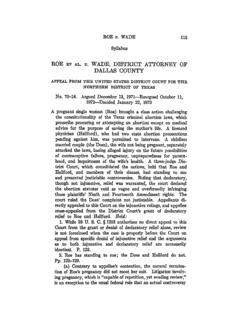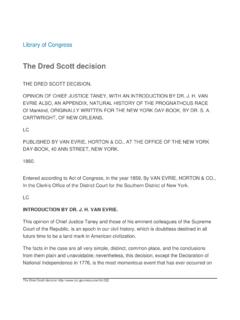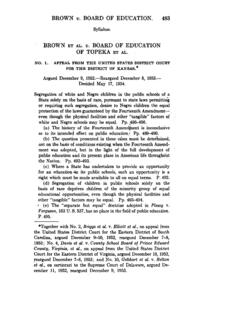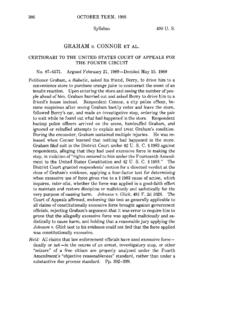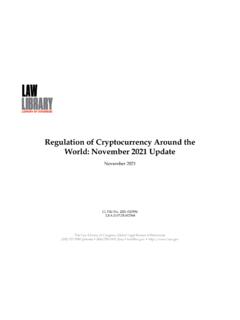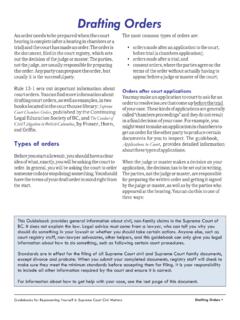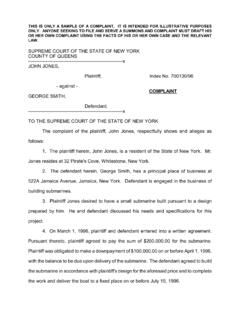Transcription of JACOBSON v. MASSACHUSETTS. - Library of Congress
1 JACOBSON v. massachusetts . 11197 U. S. v. TO THE supreme COURT OF THE STATE OF 70. Argued December 6, February 20, United States does not derive any of its substantive powers from thePreamble of the Constitution. It cannot exert any power to secure thedeclared objects of the Constitution unless, apart from the Preamblesuch power be found in, or can properly be implied from, some expressdelegation-in the the spirit of the Constitution is to be respected not less than itsletter, the spirit is to be collected chiefly from its the exclusion of evidence in the state court in a case involving theconstitutionality of a state statute may not strictly present a Federalquestion.
2 This court may consider the rejection of such evidence uponthe ground of incompetency or immateriality under the statute asshowing its scope and meaning in the opinion of the state police) power of a State embraces such reasonable regulations relatingto matters completely within its territory, and not affecting the peopleof -other States, established directly by legislative enactment, as willprotect the public health and a local regulation, even if based on the acknowledged police powerof a State, must always yield in case of conflict with the exercise by theGeneral Government of any power it possesses under the Constitution,the mode or manner of exercising its police power is wholly within thediscretion of the State so long as the Constitution of the United Statesis not contravened.
3 Or any right granted or secured thereby is notinfringed, or not exercised in such an arbitrary and oppressive man-ner as to justify the interference of the courts to prevent wrong liberty secured by the Constitution of the United States does notimport an absolute right in each person to be at all times, and in allcircumstances wholly freed from restraint, nor is it an element in suchliberty that one person, or a minority of persons residing in any com-munity and enjoying the benefits of its local government, should havepower to dominate the majority when supported in their action by theauthority of the is within the police power of a State to enact a compulsory vaccinationlaw, and it is for the legislature, and not for the courts, to determineOCTOBER TERM, of the Case.
4 197 U. the first instance whether vaccination is or is not the best mode forthe prevention of smallpox and the protection of the public being obvious reasons for such exception, the fact that children,under certain circumstances, are excepted from the operation of thelaw does not deny the equal protection of the laws to adults if the statuteis applicable equally to all adults in like highest court of massachusetts not having held that the compulsoryvaccination law of that State establishes the absolute rule that an adultmust be vaccinated even if he is not a fit subject at the time or thatvaccination would seriously injure his health or cause his death, thiscourt holds that as to an adult residing in the community, and a fitsubject of vaccination.
5 The statute is not invalid as in derogation ofany of the rights of such person under the Fourteenth case involves the validity, under the Constitution ofthe United States, of certain provisions in the statutes ofMassachusetts relating to Revised Laws of that Commonwealth, c. 75, 137,provide that "the board of health of a city or town if, in itsopinion, it is necessary for the public health or safety shallrequire and enforce the vaccination and revaccination ofall the inhabitants thereof and shall provide them withthe means of free vaccination. Whoever, being over twenty-one years of age and not under guardianship, refuses or neg-lects to comply with such requirement shall forfeit fivedollars.
6 "An exception is made in favor of "children who present acertificate, signed by a registered physician that they are unfitsubjects for vaccination." ufider the above statutes, the Board of Healthof the city of Cambridge, massachusetts , on the twenty-seventh day of February, 1902, adopted the following regula-tion: "Whereas, smallpox has been prevalent to some extentin the city of Cambridge and still continues to increase; andwhereas, it is necessary for the speedy extermination of thedisease, that all persons not protected by vaccination shouldbe vaccinated; and whereas, in the opinion of the board, thepublic health and safety require the vaccination or revaccina-tion of all the inhabitants of Cambridge; be it ordered, thatJACOBSON v.
7 U. S. Statement of the the inhabitants of the city who have not been successfullyvaccinated since March 1, 1897, be vaccinated or revaccinated."Subsequently, the Board adopted an additional regulationempowering a named physician to enforce the vaccination ofpersons as directed by the Board at its special meeting ofFebruary above regulations being in force, the plaintiff in error, JACOBSON , was proceeded against by a criminal complaint inone of the inferior courts of massachusetts . The complaintcharged that on the seventeenth day of July, 1902, the Boardof Health of Cambridge, being of the opinion that it was nec-essary for the public health and safety, required the vaccina-tion and revaccination of all the inhabitants thereof who hadnot been successfully vaccinated since the first day of.
8 March,1897, and provided them with the means of free vaccination,and that the defendant, being over twenty-one years of ageand nbt under guardianship, refused and neglected to complywith such defendant, having been arraigned, pleaded not government put in evidence the above regulations adoptedby the Board of Health and made proof tending to show thatits chairman informed the defendant that by refusing to bevaccinated he would incur the penalty provided by the stat-ute, and would be prosecuted therefor; that he offered tovaccinate the defendant without expense to him; and that theoffer was declined and defendant refused to be prosecution having introduced no other evidence, thedefendant made numerous offers of proof.
9 But the trial courtruled that each and all of the facts offered to be proved by thedefendant were immaterial, and excluded all proof of defendant, standing upon his offers of proof, and in-troducing no evidence, asked numerous instructions to thejury, among which were the following:That section 137 of chapter 75 of the Revised Laws ofMassachusetts was in derogation of the rights secured to thedefendant by the Preamble to the Constitution of the UnitedOCTOBER TERM, for Plaintiff in Error. 197 U. , and tended to subvert and defeat the purposes of theConstitution as declared in its Preamble;That the section referred to was in derogation of the rightssecured to the defendant by the Fourteenth Amendment ofthe Constitution of the United States, and especially of theclauses of that amendment providing that no State shall makeor enforce any law abridging the privileges or immunities ofcitizens of the United States, nor deprive any person of life,liberty or property without due process of law, nor deny to anyperson within its jurisdiction the equal protection of the laws.
10 AndThat said section was opposed to the spirit of the of the defendant's prayers for instructions was re-jected, and he duly excepted. The defendant requested thecourt, but the court refused, to instruct the jury to return averdict of not guilty. And the court instructed the jury insubstance that if they believed the evidence introduced bythe Commonwealth and were satisfied beyond a reasonabledoubt that the defendant was guilty of the offense charged inthe complaint, they would be warranted in finding a verdictof guilty. A verdict of guilty was thereupon case was then continued for the opinion of the SupremeJudicial Court of massachusetts . That court overruled allthe defendant's exceptions, sustained the action of the trialcourt, and thereafter, pursuant to the verdict of the jury, hewas sentenced by the court to pay a fiwi6 of five dollars.
